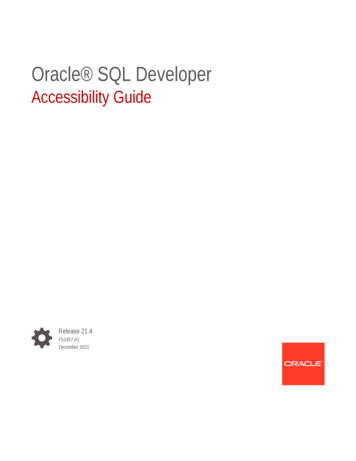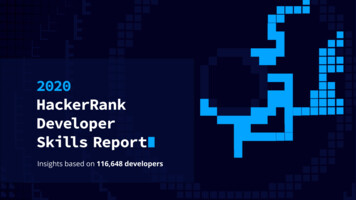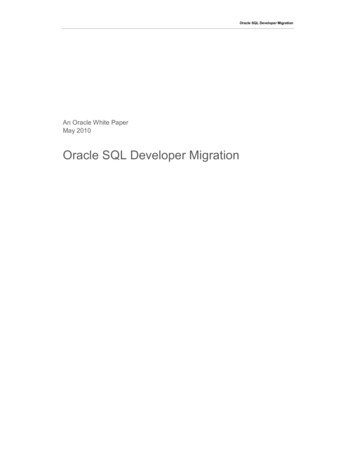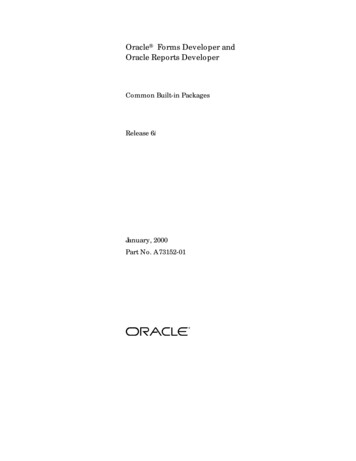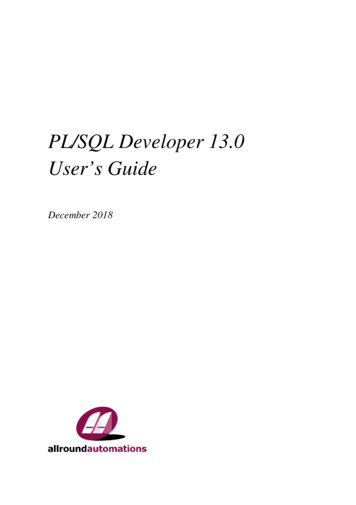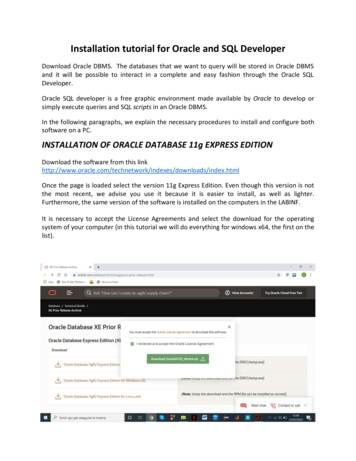
Transcription
2019DeveloperSkills Reportresearch.hackerrank.com
IntroProgramming is like art—both the process of writing code and the code in itself. Converting an idea that only existed in your headinto reality is an unparalleled feeling. It’s a kind of mindfulness that keeps you in a state of flow when you love the work you do.And, when your product impacts millions of developers and helps them find the right place to work—it’s both exciting and scary!At HackerRank we have had the opportunity to build a product that’s used by a community of more than 5 million developers(more than 20% of the world’s developer population) and more than 1,200 customers to match every developer to the right jobbased on skill. The underlying infrastructure of the hiring process is going through a dramatic shift. Candidates are now beingevaluated based on their skills and not their pedigree. This opens up a lot more opportunities for developers and smart companiesworldwide are recognizing this and making the shift.We surveyed our community with questions ranging from which technology they find the most promising to what they look for in ajob and during the interview process. More than 70,000 developers participated in the survey (that’s right!) and enclosed is atreasure trove of insight on what’s happening in the land of developers.Enjoy the report and as always feel free to tweet @hackerrank or email us research@hackerrank.com your comments.Let’s build an even playing field!Vivek RavisankarCo-founder & .comUSA: 1-415-900-4023India: 91-888-081-1222UK: 44-208-004-0258
Calculatorsare the new gamesFirst coding project by age30%Developers’ first coding projects have evolved over the course of two generations.More specifically, if you’re a developer over the age of 38, chances are your first project was20%a game. Meanwhile, younger generations were most likely to build a calculator as their veryfirst project.Some developers had unique first projects. Here are a few of our favorites: 10%I created a program that contained all the math and physics rules to help me solve myhomework funagemMtsopystemappectioDesktnalwamebsullcCaGI built a “What college should I go to?” randomizer.ite 0or“Hacked” a flash game to give me infinite health and ammunition.at 21 and underresearch@hackerrank.comwww.hackerrank.comUSA: 1-415-900-4023India: 91-888-081-122222 to 3738 to 53UK: 44-208-004-025854 to 72
Languages known in 2017 vs. 20180JavaScript: 2018’smost popular language1020304050607080JavaScriptJavaCPythonC When comparing the most popular languages that developers were learning year overyear, we found that developers were learning JavaScript at the most rapid rate. In 2018,73% of developers said they knew JavaScript, up from 66% in 2017. This also makesPHPC#TypeScriptJavaScript 2018’s most well-known language, compared to Java in 2017.PascalStudent developers are the exception. Only 42% of student developers in 2018 said theyknew JavaScript. This could be because JavaScript isn’t taught in most university computerscience programs, so more developers learn JavaScript once they’re out of school andcreating applications for nown in 2017Known in .hackerrank.comUSA: 1-415-900-4023India: 91-888-081-1222UK: 44-208-004-0258
Developers are as eager as they were last year to learn Go, Kotlin, and Python in 2019.Interestingly, developers’ interest in Scala has dropped, whereas their interest inLanguages developers want to learn in 2019TypeScript has increased. Scala was the 3rd most popular language that developersplanned to learn in 2018 but dropped to 6th place in 2019.JavaScriptJavaTypeScript went from being the 5th most popular language to learn to #4. The language’s rising popularity is most likely because of the ubiquity of JavaScript and the factthat many major JavaScript frameworks use TypeScript. In fact, almost a quarter ofdevelopers know Typescript this year, up from 15% last year.CPythonC rrank.comwww.hackerrank.comUSA: 1-415-900-4023India: 91-888-081-122210%20%UK: 44-208-004-025830%40%
React poised to overtakeAngularJS in 2019Frameworks known in 2017 vs. 2018051015202530AngularJSSpringAngularJS continues to be the most popular framework that developers know.However, more and more developers have begun to learn React. The percentage ofdevelopers who know React jumped from 20% in 2017 to 26% in 2018.ReactExpressJSASPDjango.NETCoreRuby on RailsVue.JSStrutsJSFBackbone.JSCocoaMeteorKnown in 2017Known in hackerrank.comUSA: 1-415-900-4023India: 91-888-081-1222UK: 44-208-004-025835
The number of developers who know React is likely to keep increasing. It’s the #1Despite developers taking a stronger interest in React, companies’ appetite for thisframework that developers want to learn in 2019. The transition from Angular 1 tofront-end framework outpaced the number of developers who knew React in 2018.Angular 2 did not allow for backwards compatibility, which could explain why develop-The JavaScript ecosystem is constantly evolving and often difficult to keep up with,ers are moving towards a different framework. React is also considered to be simplerbut it’s obvious that learning React is a worthwhile investment for developers.and more flexible than AngularJS, making it poised to overtake AngularJS.Frameworks developers want to learn in 2019Frameworks hiring managers wantvs. frameworks developers know40%30%30%20%20%10%10%0USA: 1-415-900-4023India: 91-888-081-1222Developers who knowUK: 44-208-004-0258Py orramiPa ddrinoreteMFbeJSEmcoatsruCobockHiring Managers who .jsParSpBaASReAn acgu tlarJSSpringVue.NjET sCoreDjangExoRu presbysJon SRailsAngularSp JSringReEx apr ctessJSASD Pja.N ngRu ET oby Coon reRailVu se.jSt srutsBack JSbo Fne.jSp sarCo kcM oaeteoEm rPy berramPa iddrino0
IoT is the most realisticnew techThe real world application of technologies by 2020100%80%Internet of Things (53%), just above Deep Learning (50%), is predicted to be the mostadopted new technology in the next two years. The increasing connectivity of60%homes, cars, and even cities is evidence of this technology having the best chance ofreal-world application by 2020.40%Application of Deep Learning is expanding from mobile speech recognition softwareto places like the healthcare sector and automotive industry, which could explainwhy developers consider it a realistic technology.20%ginmcoumntuadQtegmenOn the other end of the spectrum, with a fluctuating cryptocurrency market but ouCllepeeDInternetofskills needed to work on these technologies will be valuable for developers.arThniinAs IoT and Deep Learning continue gaining momentum, it’s clear that picking up thenggs0Authe support of many of the biggest companies in the world, blockchain is anunpredictable technology. 20% of developers said the real-world application ofblockchain in the next two years is mOverhypedUSA: 1-415-900-4023India: 91-888-081-1222UnrealisticUnsureSomewhat realisticUK: 44-208-004-0258Very realistic
Best music to listen to while codingDance and electronicmusic fuel seClassicalRockPopDevelopers who listen to music while working were most likely to turn to danceand electronic music to help them get into the flow of coding. Developers whoMetalare 21 years old or younger were more likely than any other age group to listento hip-hop and rap while working.Hip-hop/RapSoul/BluesFolkR&BReggae21 and underresearch@hackerrank.comwww.hackerrank.comUSA: 1-415-900-4023India: 91-888-081-122222 to 37UK: 44-208-004-025838 to 5354 to 7245
The #1 pet peeve: Badlywritten documentationOne of the biggest bugs:‘Wiped out database’Developers’ struggles are real.and we wanted to find out what frustrated them theWhen asked about their biggest bug in production, deploying untested or brokenmost. Junior developers particularly despised badly written documentation whilecode was the most common response. We also found that 10% of developerssenior developers thought spaghetti code was the worst.admitted to wiping out the entire database.The #1 pet peeve at workThe biggest bug in production01020304050607080Badly writtendocumentationDeployed untested or brokencodeSpaghetti codeWiped out databaseEverything is a top priorityShut down production serverEstimates treated asdeadlinesTurning on Firewall withoutallowing SSH accessForgot to turn the IIS back onafter deployment (Server down)Ghost bugs“Works on my machine”OtherIrrelevant messages fromrecruiters020%Meeting invitationsJunior DeveloperChat pings (Slack, Hipchat,etc.)Senior Developer or : 1-415-900-4023India: 91-888-081-1222UK: 44-208-004-025840%60%
58% of developerstook action in responseto concerns aboutemployers2018 was the year of taking action — from employee walkouts to company boycotts.In fact, 58% of developers polled took action in response to concerns about theircompany. Examples of concerns included affiliations with privacy misuse andActions taken in response to concernsabout employersTalked to your leadership aboutyour concernsQuit your job or looked foranother jobWouldn't recommendworkplace to othersProtested in personal capacity,but kept my work life separateRefused a projectcensorship. Close to 40% of developers approached their leadership about theirconcerns regarding their company. 23% quit their job or began looking for anotherposition in response to misgivings.Openly expressed concerns onsocial mediaOtherNone of the : 1-415-900-4023India: 91-888-081-122210%20%UK: 44-208-004-025830%40%
Actions taken in response to concernsabout employers according to ageConventional wisdom dictates that younger generations are more likely to takeaction and older generations are more content with the status quo. That’s not whatthe data tells us.Across the board, the older the developers, the more likely they were to refuse towork on projects, protest, discourage others from joining companies, quit their jobs,look for new jobs or speak to management in response to concerns about theircompany.Talked to your leadership aboutyour concernsQuit your job or looked foranother jobWouldn't recommendworkplace to othersProtested in personal capacity,but kept my work life separateThe only exception to this is when it comes to social media. Developers who are 21years old or younger were the most likely to openly express concerns on socialRefused a projectmedia.Openly expressed concerns onsocial mediaOtherNone of the above021 and underresearch@hackerrank.comwww.hackerrank.comUSA: 1-415-900-4023India: 91-888-081-122220%22 to 3740%38 to 53UK: 44-208-004-025854 to 7260%
Immigration policiesimpact access to techtalentImpact of US immigration policies on alldevelopers surveyedDiscouraged me (orsomeone I know) fromapplying to jobs in the USUnable to get a work visaSilicon Valley has largely been composed of immigrants, with 57% of its technicalworkforce born outside of the United States. But, our survey found that 4 in 10Made recruitment of techdevelopers were negatively impacted by immigration policies in 2018.Nearly 1 in 5 developers who applied for a US work visa were denied. In fact, manyDecided not to attenduniversity in the USdevelopers were discouraged from even applying. Almost 25% of developers statedthat US immigration policies discouraged them or others they knew from applyingto jobs in the country.Delayed founding orexpanding company in USStarted a tech companyoutside of the US4 in 10 developers haveNot applicablebeen negatively impacted byimmigration policies in 2018None of the : 1-415-900-4023India: 91-888-081-122210%20%30%UK: 44-208-004-025840%
Impact of US immigration policies on US hiringmanagers vs. global hiring managers0The demand for developers in the United States is expected to grow much fasterthan average in the next 5 years. However, US employers are starting to havedifficulty finding the developers they need. 30% of US hiring managers saidimmigration policies made recruitment of tech talent difficult in 2018.51015202530354045Made recruitment of techtalent more difficultDiscouraged me (orsomeone I know) fromapplying to jobs in the USHired offshore tech talentUS Hiring ManagersDelayed founding orexpanding company in USGlobal Hiring ManagersUnable to get a work visaStarted a tech companyoutside of the USDecided not to attenduniversity in the USNone of the aboveNot mUSA: 1-415-900-4023India: 91-888-081-1222UK: 44-208-004-0258
The #1 way to losedeveloper candidates:Unclear rolesWhat turns developers off from employersNot enough clarity on role orwhere I’ll be placedLack of (or slow) follow upNot aligned with my culture orvaluesA poor interview experience is a surefire way to lose top candidates in today’scompetitive tech talent market. Developers were most likely to be turned off byemployers who don’t provide enough clarity around roles or where they’ll be placed.49% said lack of values alignment was a turn-off and 14% reported not enoughdiversity on the panel was a deal-breaker.Brainteasers or other irrelevantquestionsNot enough prep for what toexpect/processNegative press coverageNot enough diversity on k.comUSA: 1-415-900-4023India: 91-888-081-122220%40%UK: 44-208-004-025860%80%
What developers look for in a jobProfessional growthand work-life balancematters most010203040506070Professional growth &learningWork-life balanceCompetitive compensationInteresting problems tosolveFlexibility ( schedule,remote)The most important factors for developers, across all job levels and functions, wasthe opportunity for professional growth and work-life balance.Company culturePreferred tech stackDevelopers are voracious learners by nature and necessity, given tech’s rapidlychanging pace. The importance of work-life balance for both senior and junior isaligned with studies which have found that employees who do significant amountsof overtime are at a large risk of burnout, leading to a decrease in productivity, highturnover, and even health concerns.Strength of engineeringteamValues aligned with yoursJunior DeveloperPrestigious company brandSenior Developer or HigherWorkplace diversityHiring manager qualityVacation .comUSA: 1-415-900-4023India: 91-888-081-1222UK: 44-208-004-025880
What developers look for in a job in different regions01020304050Professional growth &learningWork-life balanceCompetitive compensationFor developers working in North and South America, compensation was the thirdmost important aspect of a role.Interesting problems tosolveFlexibility (schedule,remote)Even though Asian-Pacific, European, Middle Eastern, and African developers rankedCompany culturehaving interesting problems to solve at work higher than salaries, compensationwas still one of their top 5 priorities.Preferred tech stackStrength of engineeringteamValues aligned with yoursPrestigious company brandWorkplace diversityAPACEMEAHiring manager qualityVacation .comUSA: 1-415-900-4023India: 91-888-081-1222UK: 44-208-004-0258AMERICAS607080
MethodologyHackerRank conducted a study of developers to identify trends in developer skills, work, and employment opportunities.A total of 71,281 professional and student developers from more than 100 countries took the online survey fromNovember 5 to November 27, 2018. The survey was hosted by SurveyMonkey and HackerRank recruited respondentsvia email from their community of over 5 million members and through social media sites.Tests of significant differences were conducted at the .01 level (99% probability that the difference is real, not by chance).Percentages may not always add to 100% due to rounding.More Research2018 StudentDeveloperReport2018 Womenin TechReport2018DeveloperSkills ReportRead ReportRead ReportRead : 1-415-900-4023India: 91-888-081-1222UK: 44-208-004-0258
research.hackerrank.comInsights based on39,441 developers39,441 developerstook the survey01
PR O LO GU EH AC K ER R A N KHello World The future of work will be very different. Irrespective of your job, it will becomeimportant for everyone to learn how to code. Coding helps enrich yourcomputational thinking, which is powerful in making decisions. The traditionalresume will go away and hiring will happen based on your skills first.We launched HackerRank in late 2012 with the goal of matching every developer tothe right job. And the growth has been amazing — we reached 3.2M developers inthe community and powered 2% of all developer hires last year.For the first time, we surveyed the HackerRank community to get a pulse ondeveloper skills (when did they push code for the first time, how do they learncoding, what are the favorite languages and frameworks, what do they want ina job, what hiring managers want in a candidate, and more). There are somegreat insights, from 39,441 responses, that we are happy to share with you today.Did you know that 1 in 4 developers learned to code before they could drive?We hope you find the 2018 Developer Skills Report insightful and would love todiscuss the findings with you. E-mail us at research@hackerrank.comVivek RavisankarCo-founder & CEO03
L E A R N I N G&H AC K ER R A N KED U C AT I O N1 in 4 developers started codingbefore they could drive It’s never too early — or too late! — to start coding. Of the roughly 39,000 developers surveyed across all professional levels, more than a quarter of developers wrotetheir first piece of code before they were 16 years old.Meanwhile, of all the developers who started coding after the age of 26, 36% arenow senior or even higher-level developers, growing quickly in their careers.When did you start coding?40%11 to 1516 to 2021 to 255.2%19.4%5 to 1049.6%021.1%20%4.8%Developers (%)60%26 Age groupresearch.hackerrank.com04
L E A R N I N G&H AC K ER R A N KED U C AT I O NNearly all developers have aninsatiable thirst for learning It seems like every year there’s a new hallmark programming language,How did you learn to code?framework or library that proliferates across developer blogs. First, it was allabout Backbone.js. Now, everyone is raving about AngularJS and React. Selfteaching is the norm for developers of all ages. Even though 67% of developershave CS degrees, roughly 74% said they were at least partially self-taught.73.7%Self-taughtOn average, developers know 4 languages, and they want to learn 4 more. Thedegree of thirst for learning varies by generations — young developers69.4%School or universitybetween 18 and 24 plan to learn 6 languages, whereas folks older than 35 onlyplan to learn 3.Since programming is centered on independent research aimed at solvingnew challenges, self-teaching is a major part of being a successful developer.In choosing what to learn next, the best guiding principle is to plant yourself inone discipline and learn tools as a means to grow. Tools will always change.Accelerated trainingOther8.8%2.2%Developers (%)Ultimately, it’s curiosity and genuine interest in programs that should fuel thedrive to learn new tools and adapt to tech’s evolving landscape.research.hackerrank.com05
I N - D EM A N DH AC K ER R A N KQ UA L IF I C AT I O NSAlmost all employers prioritizeproblem-solving skills first Problem-solving skills are almost unanimously the most important qualificationWhich core competencies do employers look for?that employers look for .more than programming languages proficiency,debugging, and system design. Demonstrating computational thinking or the1 to 100employeesability to break down large, complex problems is just as valuable (if not moreso) than the baseline technical skills required for a job.101 to 1,000employees1,001 %Programminglanguage %48.5%47.1%System 4.0%35.0%37.0%36.0%companies.Code .4%34.1%34.8%The difference may exist because having the right knowledge of 2%Database design23.2%20.5%18.8%20.9%Codebase navigation17.6%14.2%13.2%15.1%There are, however, some nuances between what small companies care aboutmost versus what large companies care about. For instance, smaller companieslook for framework proficiency in candidates more than medium-sized to largeis more important for startups since they need to launch code quickly, andframeworks help developers push code faster.research.hackerrank.com06
I N - D EM A N DH AC K ER R A N KQ UA L IF I C AT I O NSWhat you do matters more thanwhat’s on your resume There’s a popular belief that recruiters favor candidates with CS degrees fromWhat qualifications do employers look for by company size?prestigious universities. But it turns out that they actually care about what you’vedone — not where you went to school. An overwhelming majority of hiring managers said they look for proven skill, such as previous work, years of experience, andprojects/Github. Regardless of company size, 9 out of 10 hiring managers sayprevious experience and years of experience — both indicators of skill — are amongExperience90.6%Portfolio (e.g. GitHub)72.7%the most popular qualifications.EducationWhat you do matters more than anything else. Small companies place the highervalue on the portfolio: 80% versus 66% of large companies.Qualifications that generally bolster the resume (prestige of degree, education level,skill endorsements or certificates) rank the lowest among what companies care41.7%TrainingPersonal brand (e.g. skills &endorsements)23.7%8.2%Employers (%)about the most. These factors are not indicative of proven skill. The only top-rankedqualification that’s easily screenable from a resume is “years of experience” sincework experience and portfolio are sometimes correlated with this qualifier. Sinceit’s more difficult to review individual portfolios at scale, years of experience is analternative, resume-based signal for proven skill — although this completelyneglects high performers who grew quickly in their roles.research.hackerrank.com07
TA L EN TH AC K ER R A N KAT T R AC T I O NAssessing skills proves to be the biggest hiringchallenge, more than talent shortage What’s the biggest challenge when hiring talent?Hard to assess skills beforeonsite60.8%47.5%Time-consuming interviewsWhich assessment tools do employers use most?80.9%Resume screeningOther problem-solving,logic challenges55.8%50.8%Referrals41.1%Not enough talentNot enough diversecandidatesCalibrating the jobdescriptionCompetition from othercompanies28.3%Remote, live interviewingtool26.7%25.2%Personality testHackerRank codingchallenges26.8%Outsourced humantechnical interview panel22.1%Other19.2%6.6%3.7%Companies (%)Companies (%)According to 7,000 employers, resumes are still by far the most common wayWhile technical hiring managers still primarily rely on the resume to evaluatedevelopers are assessed today, according to our survey — 81% of hiring managerssoftware developers as the first step of the interview, almost all agree that assess-say they use resumes as the first step in the applicant screening process.ing skill is one of the hardest challenges when filling technical roles — there’s amismatch in what they’re looking for and the tools they’re using to evaluate it.When asked what the biggest hiring challenge is, the same hiring managers saidScreening with resumes is a barrier for hiring managers to find the proven skillassessing skill is their number one problem — as opposed to lack of talent. Mean-because the factors that hiring managers care most about (proven skills) are notwhile, only 55% of developers said resumes were a good reflection of their abilities.screenable from resumes.research.hackerrank.com08
TA L EN TH AC K ER R A N KAT T R AC T I O NWork-life balance beats perks If you look at any typical career page for technology job descriptions, hiringWhat do developer candidates want most when job searching?managers commonly highlight tech stack, mission statement, and perks toentice developers to apply. This is not what hiring managers should be focusingon when competing for talent.Good work-life balance56.5%Professional growth and learning55.1%45.4%CompensationInstead, the number one thing that developers want most above all is a strongwork-life balance. Developers ranked work-life balance as the most desiredtrait, slightly more than professional growth and learning, which came insecond. More specifically, the Americans crave work-life balance more thandevelopers in other regions like Asia and Europe.Smart people/team43.6%Interesting problems to solve43.3%Company culture39.2%Preferred tech stack27.4%Impact on product16.2%Company mission14.3%Proximity to where you liveThough it was ranked slightly less important to people working at smallercompanies, it was still in the top three. Work-life balance is most important todevelopers 25 years and older, and — unsurprisingly — ranked less important13.5%Perks9.9%Stability of a large companyFunding and valuation9.0%4.4%Developers (%)to developers between 18 and 24.In some ways, we’ve discovered a slight contradiction here. Developers want work-lifeGeographically, the distinctions aren’t too major, with a few exceptions.balance but they also have an insatiable thirst and need for learning. In fact, theCanadians care most about compensation, while Australians cite companynumber of new tools to learn can sometimes feel overwhelming for developers. But theculture as the #1 thing they care about in a job.best fuel for learning is curiosity and genuine interest in technologies that develop inyour domain. Focusing on doing what you enjoy (as opposed to trying to learn everything) can help strike a better work-life balance.research.hackerrank.com09
TA L EN TH AC K ER R A N KAT T R AC T I O NFlexible work schedules are huge We realize work-life balance could mean a lot of things to different people. So,How can employers improve work-life balance?we dug a bit deeper into what developers really want.By and large, work-life balance can be supported with flexible hours — 10 am to8 pm schedules are commonplace.Allow flexible work hours89.3%Remote working80.5%Focus on outcomesDevelopers want to work for managers that focus on output, not time spent in78.5%Encouraged vacation time55.3%the office chair. And telecommuting options are helpful as well. Remote workingbenefits54.3%is a particularly strong desire for developers 25 and older, and folks between 25Foster creativity- 44 are the strongest proponents of shutting down email after hours.41.0%No after-hours emails40.9%Health initiatives39.9%Help with daily errandsHelp with childcare22.7%19.9%Developers (%)research.hackerrank.com10
Learn More About HackerRankH A C KE R R A N K COM MU NITYHA C K ER RA N K FOR W OR KBUSINESSJoin over 5 million programmers,improve your coding skillsHackerRank for Work is the leadingend-to-end technical recruitingplatform for hiring mUSA: 1-415-900-4023India: 91-888-081-1222UK: 44-208-004-0258
research.hackerrank.comMatch Every Developer to the Right JobUSA:India:UK:research@hackerrank.com 1-415-900-4023 91-888-081-1222 44-208-004-0258www.hackerrank.com
are the new games Developers' first coding projects have evolved over the course of two generations. More specifically, if you're a developer over the age of 38, chances are your first project was a game. Meanwhile, younger generations were most likely to build a calculator as their very first project. Some developers had unique first projects.



